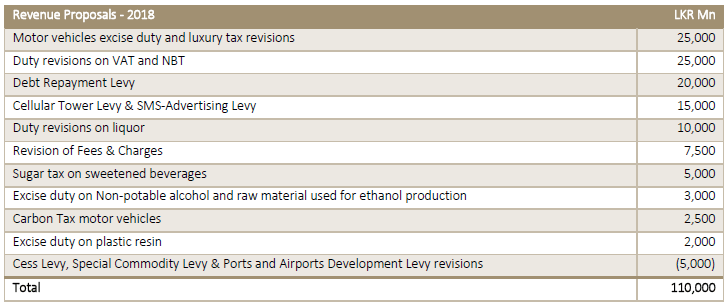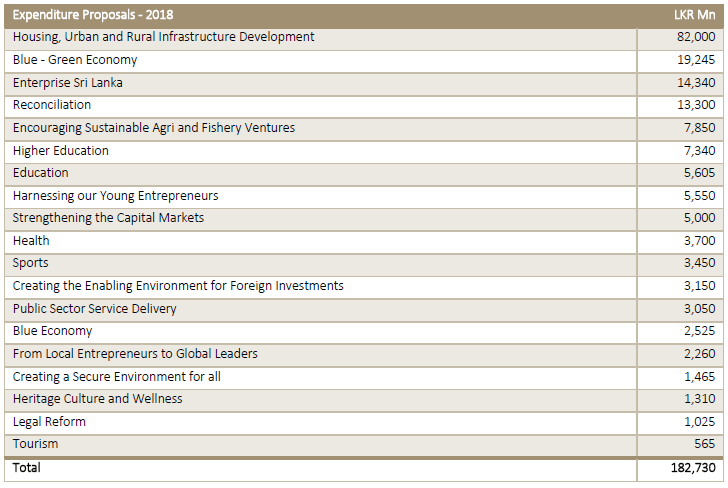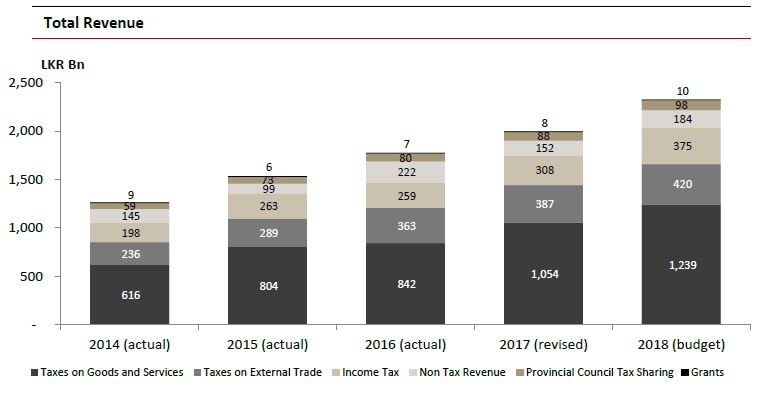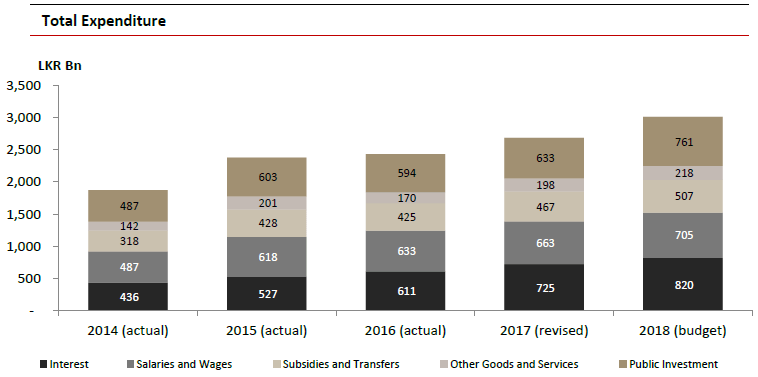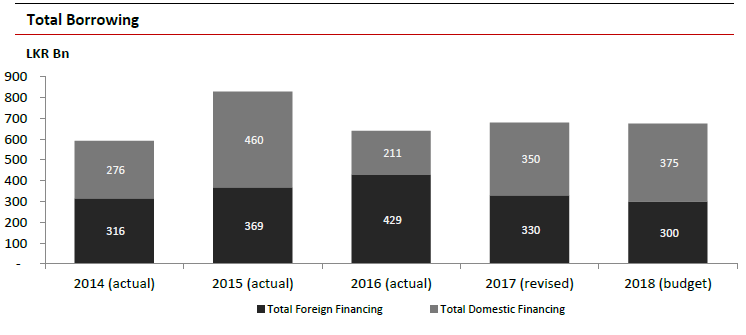
The 2018 national budget proposal complemented the Inland Revenue (IR) bill and the policy reforms set out in the recent economic policy statement. Under the budget themed ‘Blue – Green Budget: Enterprise Sri Lanka’, the Government of Sri Lanka (GoSL) expects to integrate the full economic potential of ocean related activities in formulating the overall sustainable development growth strategy while reviving the entrepreneurial spirit of the country. The budget strives to support the medium-term targets such as:
- USD 5,000 per capita income
- 1 Mn new jobs
- FDI inflows of USD 5 Bn
- Doubling exports to USD 20 Bn
- GDP growth of 5%
- Inflation nearly 6%
The overall budget deficit for 2017 is estimated to be 5.2% of the GDP, which is higher than the target of 4.6%. The provisional total revenue and grants for 2017 is 15.4% of the GDP, which is the highest since 2008. This reflects the GoSL’s continuous efforts on fiscal consolidation. The budget deficit target for 2018 is 4.8% of GDP, with a revenue and grant target of 16.4% of GDP, which is expected to be strengthened by the new IR Bill and the 2018 budget proposals. The total expenditure is targeted to be 21.1% of GDP. Approximately, 56% of the deficit is expected to be financed by domestic sources.
The following could be identified as salient features of the 2018 national budget.
Continuous effort in fiscal consolidation
The budget has focused on addressing the longstanding challenges of twin deficits, namely fiscal deficit and the current account deficit. The budget attempts to bring the fiscal deficit down to 4.8% of GDP in 2018, mainly with the revenue mobilization expected from the IR Bill. The primary surplus of 0.3% (provisional) in 2017 is expected to improve to 1.0% in 2018.
The revenue proposals of the budget are expected to raise further LKR 110 Bn in 2018. A tax revenue increase of 19.4% (provisional) is expected in 2017, mainly driven by the increase in indirect tax. The direct tax as a % of the total of tax revenue is expected to improve from 17.6% in 2017 to 18.4% in 2018. The public investment for 2018 is expected to be LKR 761Bn, which is lower than the GoSL’s Public Investment Programme in 2017.
To address the current account deficit, the budget proposes several measures through trade reforms, which is expected lead to trade liberalisation and national competitiveness. Under the new proposals;
- The para-tariffs applicable on the tariff lines, which currently do not carry any customs duties will be abolished within the next 3 years. In 2018, nearly 1,200 para-tariffs will be removed. A trade adjustment programme will be introduced to provide relief and support to the local private sector to adjust to the proposed system. Additionally, the private sector will be supported by the National Export Strategy and Export Market Access Support.
- Introduce Anti-Dumping and Countervailing laws together with strengthened Consumer Protection laws whilst also augmenting the National Quality Infrastructure. Furthermore, anti-competitive laws will be introduced for private sector to better facilitate growth through scale, whilst ensuring a level playing field.
- Prominence has been given to the fisheries sector for which LKR 3.3 Bn has been allocated. The fisheries industry is expected to reap the benefits from the lifting of the EU ban and the receipt of EU GSP+, which could be a valuable agricultural export in the export basket.
FDIs to support economic growth
Sri Lanka is committed to adopt an economic strategy through export driven Foreign Direct Investment (FDI) in the recent years. There are several proposals, which have supported this strategy in the budget. The following initiative has been taken to attract FDIs;
- In order to support and establish industrial parks, GoSL has provided support to Rojana Industries of Thailand to establish an industrial park at Milleniya with an investment of USD 500 Mn. This venture will be provided with land and necessary infrastructure such as electricity, water, access roads, etc by GoSL. Similar support will be extended to the proposed Industrial Zones in Bingiriya and Weligama. An LKR 2.5 Bn has been allocated to this initiative. The Board of Investments (BOI), the relevant line agencies and the newly established Public Private Partnership (PPP) unit at the ministry will collaborate in facilitating such ventures. Work has commenced on the establishment of the Hi-Tech Innovation Park in Pitipana with an allocation of LKR 100 Mn.
- Establish a ‘One Stop Shop’ for business registration via the introduction of a single identification system while streaming and digitizing records.
- Introduce an e-local government application system, automated construction permit issuing mechanism, integrated Land Registry (eLR), digitized 45 Land Registers, and establishing a National Single Window connecting 31 State agencies with the Customs Department to ease the process of starting a business.
The above initiatives will also help Sri Lanka to gain momentum in the Doing Business Index.
Infrastructure development
In order to support the country’s growth wave, LKR 82.0 Bn has been allocated for the infrastructure development of which a majority of LKR 41.5 Bn has been allocated to the Western Region Megapolis. Similarly, LKR 12.0 Bn has been allocated for the Township and Strategic City Development programme in Kandy, Anuradhapura, Galle and Jaffna. Furthermore, LKR 2.0 Bn has been allocated to implement the master plan of Kalmunai and Samanthurai and to develop townships in lagging regions.
To improve the connectivity from Western Province to the up country, the Central Expressway project has been allocated an amount of LKR 10.0 Bn. In addition, a LKR 3.0 Bn has been allocated for the improvement in the rural road network and a further LKR 1.0 Bn has been allocated for the rehabilitation of roads that were affected by the natural disasters due to floods and landslides.
Furthermore, construction of a wall for flood protection in the Kelani basin and new multipurpose reservoirs at Wee Oya, Nawatha, Holombuwa and Reucastle with an allocation of LKR 4.5 Bn.
Allocation of LKR 3.0 Bn also has been made to fast track the establishment of the Aruwakkalu waste disposal and management site.
To share the investment burden, the GoSL is expected to issue PPP guidelines for sectors covering transport and highways, power, ports, water supply, healthcare, education, housing, agri-business, retail and minerals.
Structural reforms to support growth
The GoSL’s reform effort will continue in the coming year in line with Vision 2025. Reforms will take place with acts to be enacted such as Liability Management Act, Public Finance Management Act; Acts to be repealed such as Revival of Underperforming Enterprises or Underutilized Assets Act; followed by the amendments to acts and laws such as Public Contracts Act, Land (Restrictions and Alienation) Act, Shop and Office Employees Act and Bankruptcy laws.
Refining the labour stock
It has been identified that, a primary constraint on attaining sustainable growth for Sri Lanka is the nation’s human resource pool with inadequate professional and technical skills. Several proposals has been brought forward by this budget to address this issue.
- Investing in the youth population to ensure they possess and develop the necessaryskill sets demanded by the private sector (emphasizing on vocational and skills training) with an allocation of LKR 5.6 Bn.
- Allocating LKR 3.5 Bn to the school education system with a focus on improving the ratio of Science, Technology, Engineering and Medicine (STEM) to Non-STEM graduates in the country. Furthermore, LKR 1.3 Bn was allocated for continuous professional development for teachers whilst LKR 0.8 Bn was allocated to strengthen the “Smart Classroom” concept, digitalization and development of e-text books.
- In addition, under the reform efforts, amendments are to be made to the existing labour laws and Shop and Office Employees Act allowing employees to work 5 days a week with flexible hours.
Strengthening the backbone of the economy
The Small and Medium Enterprises (SME) sector is a vital pillar of the economy, contributing over 50% of GDP and 35% of the employment. The main impediment for the sector has been identified as the lack of capital or the difficulty in accessing capital. To facilitate better capital for the SME sector, the following proposals have been introduced;
- Allocating LKR 10.0 Bn for the establishment of a Development Bank with an EXIM window.
- Further strengthening and continuing the existing credit schemes on low interest rates to support the SMEs and Micro level entrepreneurs with nearly LKR 15 Bn being disbursed. GoSL will bear the interest subsidy on these schemes.
- Extending the support mainly to the farmers, fishermen, youth and women who are already engaged in small businesses, individually or as a community, to harness their entrepreneurial capacities as a part of the Grama Shakthi initiative of the President, with the allocation of LKR 2.2 Bn.
- Launching the “IT initiative” to support the SME IT industry, which would be an angel fund to the IT industry. This initiative will be operated through the Export Development Bank (EDB) and the GoSL is to invest LKR 3 Bn in the next 5 years to support:
- The local start-ups and to attract foreign start-ups,
- Small and Medium sized IT Companies, and
- The establishment of incubators
- Establishing a SME Guarantee Fund, which will further augment the SMEs’ capacity to borrow, given that it will be considered as collateral. The fund will be extended to the “IT Initiative” and the exporters who require support.
Capital Market development proposals
- Divesting the holdings in non-strategic enterprises via the capital market.
- Allowing the Bank of Ceylon and the People’s Bank to raise debt and equity capital via the capital market whilst retaining controlling ownership.
- Ensure the necessary legal framework and policy environment are created for further development.
Sector-wise analysis
The budget proposals have been analysed based on the relative impact on different sectors of the Colombo Stock Exchange.
Read the Full Report Here.
Annexture:
